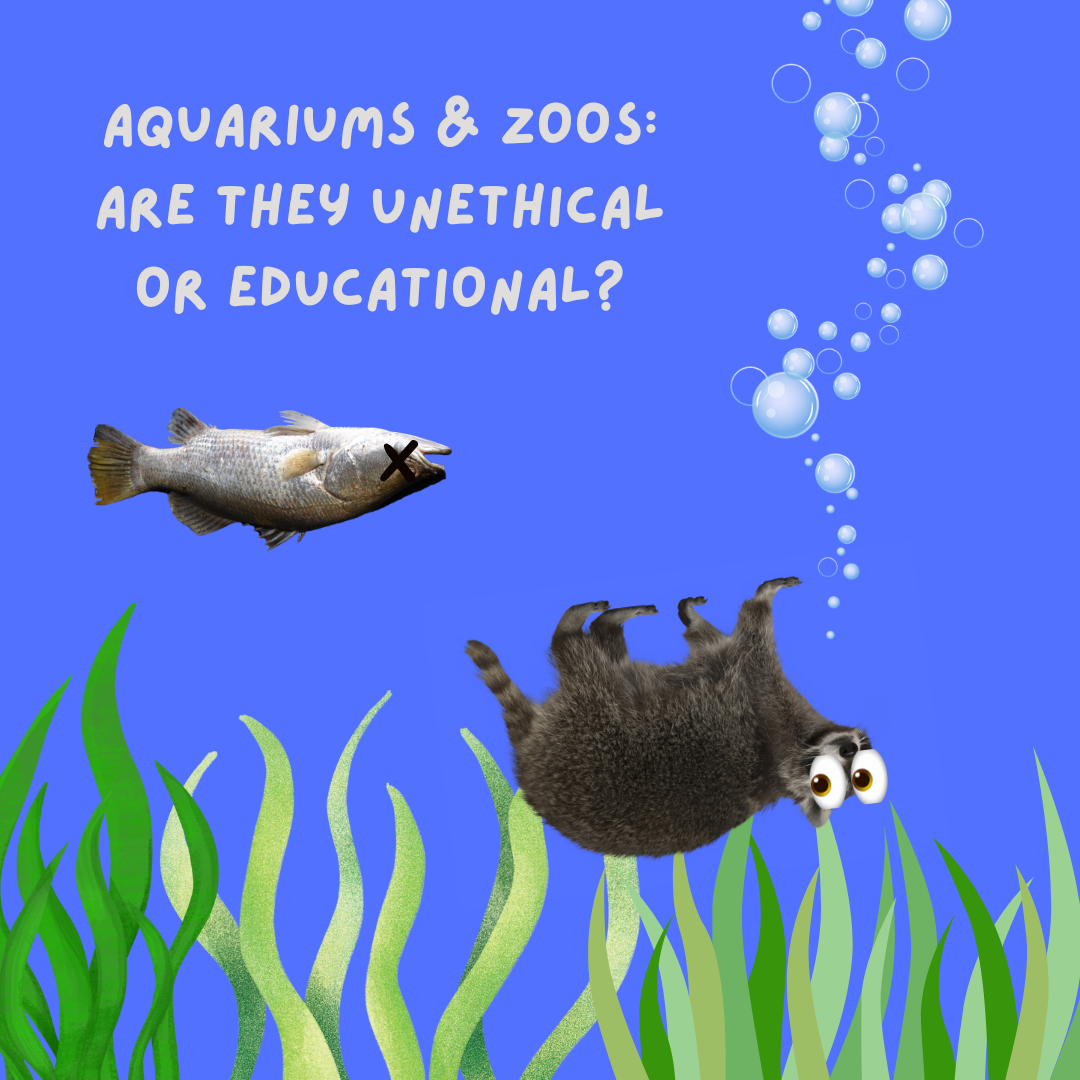The perfect summer vacation with one’s family may be a trip to the aquarium or the zoo. Even a school may take a field trip to one of these destinations, but when the family or students in question arrive to view these magnificent animals, they may wonder, Is this even ethical or educational?
What are zoos & aquariums?
According to Merriam-Webster, a zoo is “a facility with usually indoor and outdoor settings where living, typically wild animals are kept especially for public exhibition.”
To elaborate on what Webster defined, a zoo contains animals of various species in designated spaces usually designed for public viewing and further knowledge of their behaviors. Animals which we typically view in zoos are bred in captivity and prepared for release into the wild if they are an endangered species to increase low population levels of the species.
Aquariums, on the other hand, typically house aquatic animals. According to the Cambridge Dictionary, an aquarium is “a building, usually open to the public, in which many different fish and other water animals live and can be studied.”
To elaborate on what Cambridge defined, an aquarium, unlike a zoo, houses aquatic organisms within tanks which are visible to the public eye to either increase our knowledge of these species or pertain to our interests in the species.
Arguments against zoos/aquariums
It seems that while zoos and aquariums seek to do well with protecting organisms from the harsh reality of the wild, there are still arguments for and against it.
The argument against zoos/aquariums revolves around the freedom of the animal. An article by Treehugger by Doris Lin explains both sides of the argument on whether zoos are ethical or not.
In supporting zoos/aquariums, Doris’s points explain various reasons why individuals would support zoos, such as how “Many zoos have breeding programs for endangered species. In the wild, these individuals might have trouble finding mates and breeding, and species could become extinct.” Doris continues with another point, stating, “Some zoos have conservation programs around the world that use the zoo’s expertise and funding to help protect wildlife against poaching and other threats.” In a third point, Doris even explains how “By bringing people and animals together, zoos educate the public and foster an appreciation of other species.”
As for the argument against zoos, Doris seemingly observes how “From an animal rights standpoint, humans do not have a right to breed, capture, and confine other animals—even if those species are endangered. Being a member of an endangered species doesn’t mean the individual animals should be afforded fewer rights.” and explains, “Some captive breeding programs do not release animals back into the wild. The offspring may be forever part of the chain of zoos, circuses, and petting zoos.”
The same thing goes for aquariums. Animals, in my opinion, are treated in a very similar way; being held captive in tanks and domesticated to believe that the tank is their home. Some argue that aquariums are beneficial in the way that “They [people of the public] won’t have the opportunity to see creatures like sharks and rays in the wild.” But it is also important to note the health of species in both zoos and aquariums. An example of this can include the death of Tilikum at SeaWorld Orlando in the early hours of January 6th, 2017.
What does the population think?
Future Freshman at Coral Springs High School, my brother, aged thirteen and a half, comments on the ethical and educational approaches that zoos and aquariums have. He proclaims, “Zoos and aquariums are ethical and educational because they [animals] are treated properly and cared for, and are [zoos] a good method of conservation.” He adds that zoos/aquariums are “educational as they can provide significant insight to individuals when viewing animals who are not indigenous to a particular region.”
My brother also adds when questioned about the opposing side against zoos and aquariums, “Both sides conflict, but I personally stand with my opinion revolving around the proper treatment of these animals; otherwise, I would agree with the opposition.”
As for the argument regarding aquariums, I say that it is wrong to hold animals in tanks and make them believe that the tank is their home. The only exception to holding aquatic animals in aquariums is if they were abandoned or injured, which prohibits the animal in question from living a successful life in the wild. To continue, I do believe that aquariums and zoos should be free admission if anything, because in our current day and time, it does not make sense for individuals to be paying more than a dollar to see animals who do not even belong in zoos/aquariums. Maybe if the zoos and aquariums explained what our money was going towards, it would be fair game, but as of now, it makes no sense.
Is it ultimately educational/ethical?
It seems that one thing that both sides of the argument upon whether zoos and aquariums are ethical and educational or not is that they want animals to be happy and healthy.
Everyone has different opinions, and there is mixed information, such as facts and statistics showing whether the captivity of animals within institutions such as zoos and aquariums is educational or ethical or not.
In conclusion, you should think to yourself once you go on a trip to the zoo or aquarium, maybe do your homework by searching whether the practices within the zoo/aquarium are morally right or wrong, instead of paying to see harmed or potentially abused animals.







